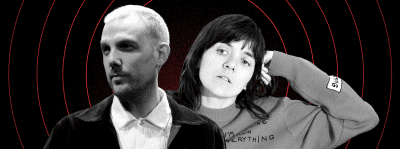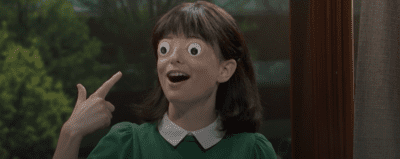Say Her Name: Why Danielle Brooks is More Than the Characters She Plays
PHOTOGRAPHY JOHN MIDGLEY
MAKEUP MICHAEL PATTERSON
HAIR TISH CELESTINE
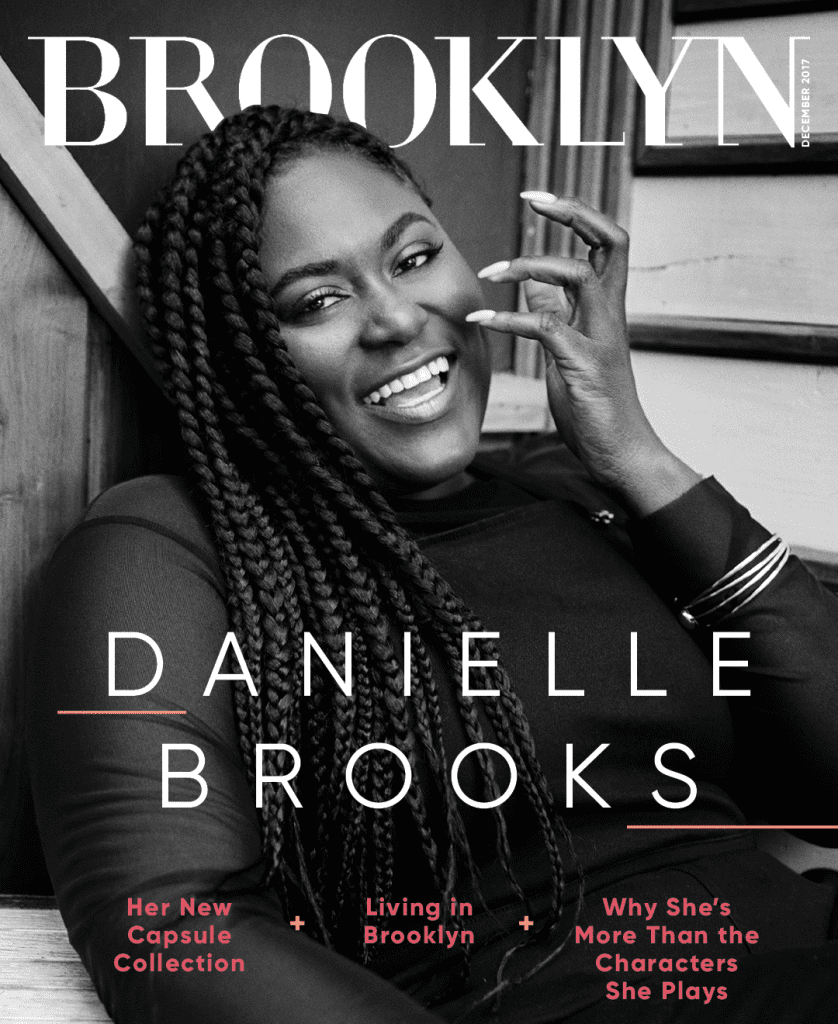

Danielle Brooks is Brooklyn Magazine’s first ever Digital Cover Star
If the mark of a brilliant actor is blurring the boundary between themselves and the characters they play, the mark of an equally intelligent audience is identifying where that boundary begins and ends, so we are not lost in the performance. But because we live in a culture obsessed with the belief that the only boundaries that exist are the ones the mind creates, actors find themselves performing for audiences who can’t see beyond the character. Sometimes we just outright refuse to do so.
We are often introduced to actors by who they play, not who they are. That line between being and performing doesn’t even exist yet. For that line to exist we, the viewers, would have to know who that person is before the opening act. But how many of us ever get to see that? More importantly, how many of us possess the courage to close the curtain on a character we’ve fallen in love with, who feels as real to us as our own flesh and blood?
This is essentially what we’re paying to see anytime we watch a movie, a Broadway play, or a television show—and it’s what actors get paid to do: to render the real in a way that’s believable to the viewer. To make us feel close to them, even when they’re a world away.
My world unexpectedly collided with Danielle Brooks’ on my first day at the magazine. Shortly after being shown my desk and given my company email, Northside’s co-founder, Daniel Stedman, forwarded a message from Danielle’s publicist, suggesting we do a feature. Here’s where I keep it 100.
I praised heaven for giving me the opportunity to write a story about Danielle. But the sky fell, shortly after, when I realized the situation’s cruel irony: it was Taystee—the character Danielle plays—who was real to me: not Danielle herself. While Danielle’s accomplishments are numerous—a Juilliard graduate, the recipient of three SAG awards, a Tony Award nominee for her role as Sofia in The Color Purple, and a Grammy winner for Best Musical Theater Album—her most impressive accomplishment, to me, is her dedication to making sure we know the names of women who often die nameless. Black women who are often overshadowed or left in the dark, altogether, without Danielle’s ability to shed light on the expanses of their being. Danielle’s performances in Orange and The Color Purple color the lives of black women who are too often painted in black and white.
For all that Danielle’s doing, the highest honor we—as viewers, audiences, and fans—can bestow upon her is the gift of putting respect on her name, by saying it. This conversation between Danielle and I—which started in the back of Clinton Hill’s Sisters and ended on the phone the following week—is as much essay as it is interview. Every question is an attempt to understand where the line between Danielle Brooks’ being and performing begins and ends—so we don’t cross it.
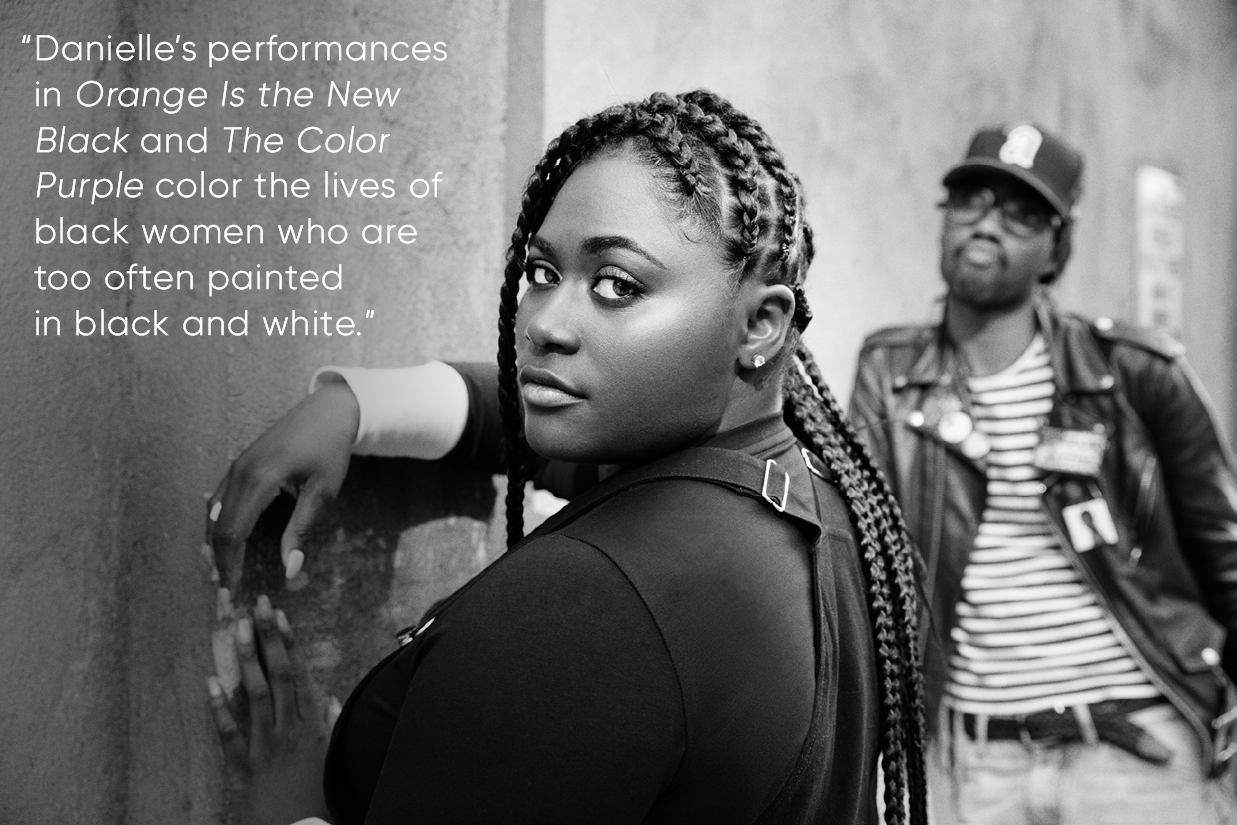

Let’s take it back to the beginning. Where did it all start?
I was born in Augusta, Georgia and raised in Simpsonville, South Carolina: a very small town where everybody knew everybody. Everybody went to the same church, the same school. I grew up with my mother and my father who’ve been married now for 33 years, and my brother who is six years younger than me.
I kind of always had this energy about me where I challenged everything. Not that I was rebellious. There was just a part of me that always saw beyond South Carolina. I was curious about there being more.
When did you first start acting?
When I was six, I played Baby Girl in the Black Nativity play the church did for Christmas. And everyone was like, “Oh my God! She’s so good!” Immediately there was talk: “Are we getting her in a program?” And before you knew it, my mother had found a way for me to get involved in all of it. Things they had for kids at Greenville’s Children’s Theater and a theater called the Warehouse Theatre.
Someone said to me the other day, a lot of actors are birthed from teachers. I never heard of that, but maybe it’s true. She found that my outlet was acting and she wants to find a way for her child to be educated in whatever they love.
If you have language for this, could you tell me why you act? What does acting, being an actor, allow you to do?
I remember I had just got accepted to Juilliard and they they asked me to do a monologue for a donor event. The monologue I chose was from August Wilson’s The Piano Lesson, and I played Berniece. When I stepped into the room there were about 20 people, all white—and it made me nervous because I’m about to tell this very black story, and I don’t know how they’re going to relate.
But after I did the monologue, all these stories started popping up: “Oh my gosh. That story was so relatable. We have family heirlooms in my family that I really wish that we could keep,” or, “I also have a piano that has our family name engraved in it.” That was mind-blowing to me.
That moment taught me that there’s so much power that lies within this art form. Acting taps into the core of who we are. I love the fact that someone who looks nothing like me can watch my character and feel so connected or feel like they see their own personal story within who I play. I didn’t realize that at first because so much of my community was immersed in stories that were closer to what we already knew.
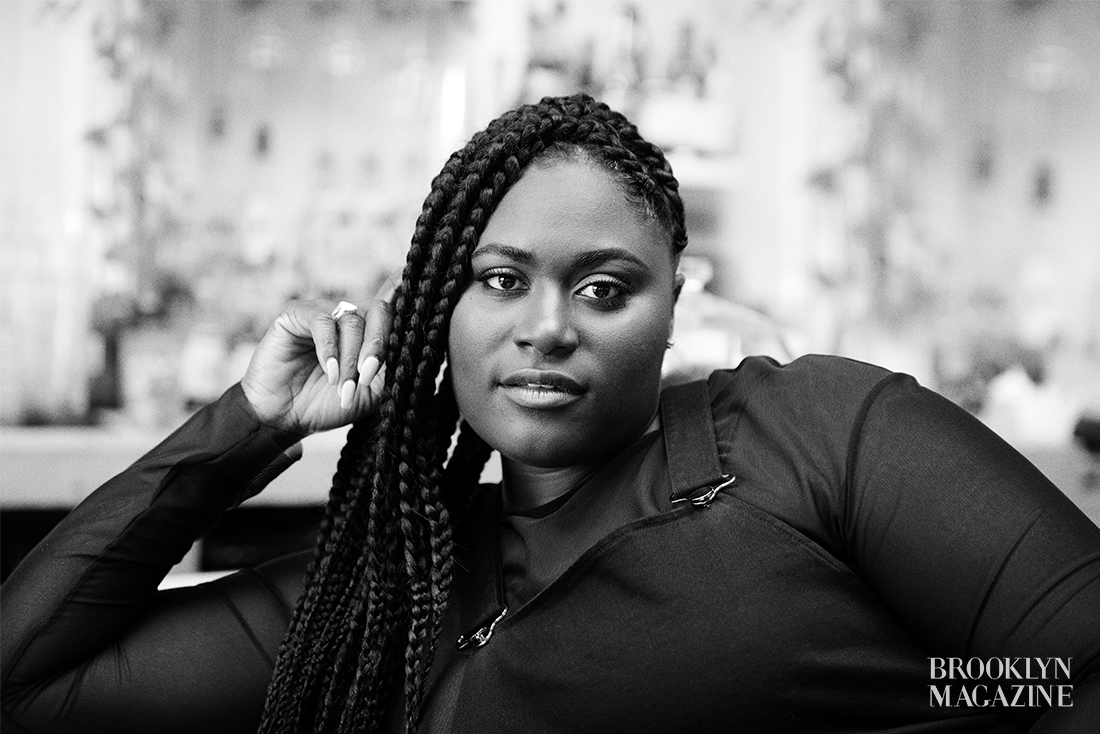

I remember you were saying in a Vulture interview, earlier this year, how you pulled from Philando Castile’s girlfriend Diamond for your monologue in this last season of Orange is the New Black, and I was thinking about the meta cycle that gets created because of that: how art imitates the life in a way that makes them indistinguishable from one another.
I think that’s why a lot of people mix up Taystee and Danielle. They think they’re going to come up to me and I’m going to be the person they see on the show. I am not Taystee. At the same time, I have to respect that people call me that only because they are relating to the character. They have fallen in love with that person. I just wish people would take it a step further and Google my name. That’s why I look forward to playing different roles and really showing the craft of what I do—getting to be in Master of None, a few movies that are coming out, and other TV shows that aren’t out yet. I’m like, “Yes, now you get to see me play some other stuff!”
Something I realized when I look at the characters you’ve played is their unwillingness to accept the circumstances that the world creates for them. You see that with Sofia in The Color Purple, knocking people’s teeth out, and with Taystee, you see her refusing to accept the Cheetos as a bargaining chip for better living conditions for the women who are incarcerated. Taystee becomes the voice of the riot. Almost to a fault, she’s a reminder that there’s more than what’s being given. When you look at these characters, what’s consistent about them?
Speaking more so on the bigger characters that I’ve played, they all seem driven towards a goal, but don’t know how to get there. The reason they are so stifled is because the system is putting them in a place to continually fail time and time again. That’s the case with Taystee and Sofia in The Color Purple.
Where would you say that you and the characters that you play are nothing alike?
That’s a good question. The difference between most of the characters that I play is I think before I act. I overthink and over-analyze everything. This isn’t to say that I’m not a risk-taker, but the characters I play have gone through way more than I have ever experienced in my life. Taystee doesn’t think things all the way through, sometimes. She is driven by her emotions a lot of times. And she has every right to work that way.
I think that’s true for Sofia, too: driven by her emotions when it came to dealing with Harpo, when it came to getting into that fight with the white man when she was taking her kids out. I think it’s the same thing, very impulsive. At the same time, I have learned from my characters.
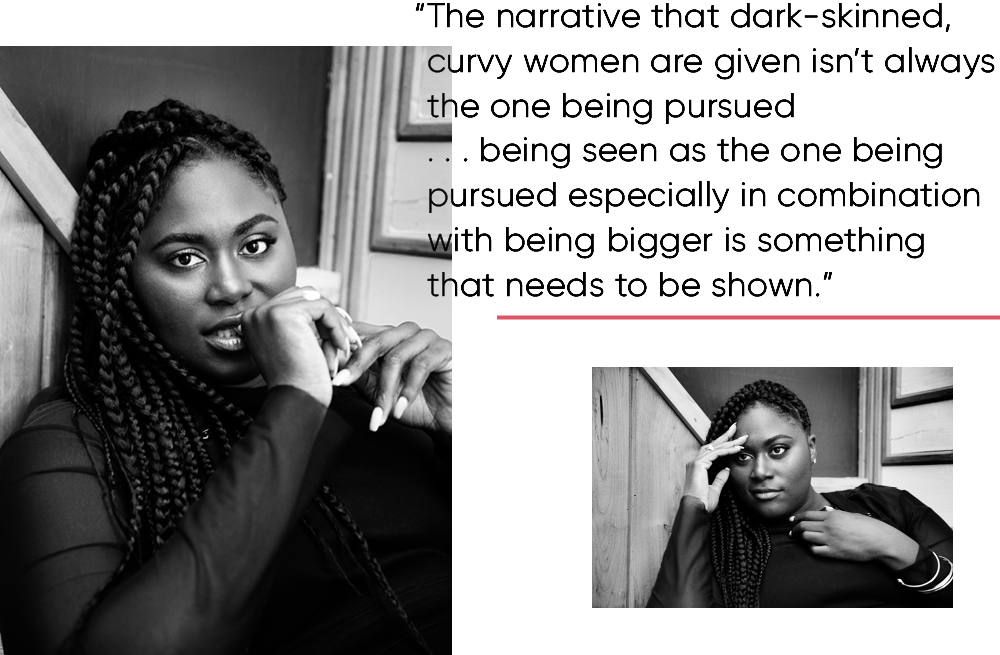

What have you learned, or better yet, what have the characters you played taught you?
In season one of Orange is the New Black, Taystee’s getting out of prison. Right before she leaves, she tells Poussey, “I don’t think anyone’s going to take me serious.” And I remember me as an actor, just coming out of college, this was my first big TV show, feeling the same way: “Is the industry going to take me serious?”
What I come to realize is that, sometimes, it wasn’t the industry, or my peers, or whomever, putting me in a box: It was me saying that I wasn’t enough. I had those fears in feeling that I was putting onto myself. That’s the same that I felt with Taystee. She was putting herself in a box. She really had all the tools to succeed within her. She kept looking for them outside of herself.
That’s the beauty of growth. That’s the beauty of seeing the character develop, the fact that she has finally broken that box for herself. She has to come to understand all that she wanted for herself years ago was already within her. That’s definitely something that Taystee taught me.
And Sofia?
Sophia gave me strength to be honest. A lot of people know that I’m doing Orange and Color Purple at the same time. Before being on TV, my goal in life was to be on Broadway. when I was finally given that gift it was terrifying to be on stage with 1,100 people watching you tell this story that was originally played by Oprah. A lot of people forgot that I was a trained actress. A lot of people just saw this girl that came from TV and thought I had a lucky break in Broadway, forgetting, or not even knowing, that I spent four years schooling for this.
I felt anxious a lot of the time, but when your character is continuously singing, “Hell no,” like Sofia does every night, it helped me say “Hell no” to my fears: “Hell no” to the anxiety and “Hell no” to me holding myself back from my own greatness. That was the gift playing Sofia gave me every night. Sofia comes in with such a strength about her. I had no choice but to follow suit.
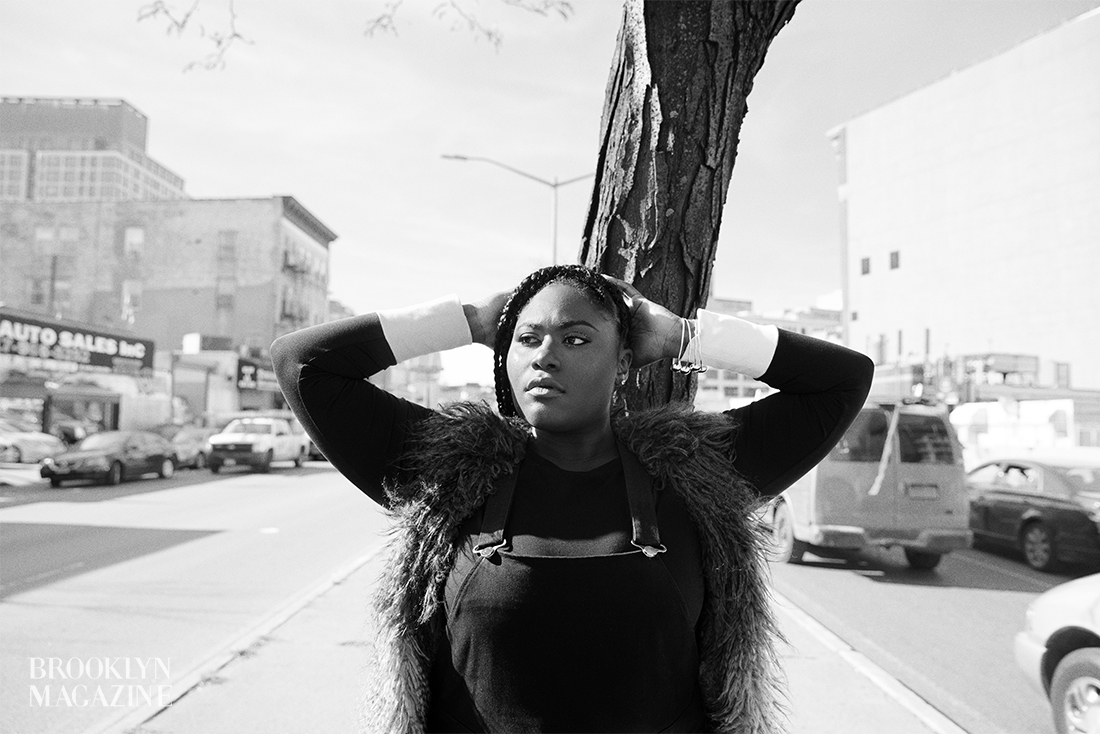

Danielle Brook poses on Atlantic Avenue
In the same Vulture interview, you spoke of wanting to play someone who’s being pursued. When I read that I immediately wondered how much of you not playing someone who’s pursed has to do with the fact that you’re a thicker black woman. In our society, there’s this idea that “no one pursues those women.” I know that’s not true, but when you don’t see it represented on television, it’s hard for some people to think otherwise.
That’s 100 percent why. The narrative that dark-skinned, curvy women are given isn’t always the one being pursued. The one that is sexy. The one that is confident in her body. The one that embraces every curve. We’re the ones chasing, or the ones that are sad because we’ve gained weight. And it’s not only about being plus-size. It’s also being dark-skinned. We really have been the bottom of the barrel when it comes to beauty on television. And being seen as the one being pursued especially in combination with being bigger is something that needs to be shown.
I kept stressing this with Sofia. People forget how sexy Sofia is. She had over five kids with Harpo. There had to have been something about her presence that was sexy. As for Taystee’s character, when Poussey started liking her I was like, “Whoa. Yeah, of course I could play the love interest.” Especially when fans are constantly like, “Oh, you’re so pretty in person. You look different from your character.” How am I supposed to feel? I’m wearing my natural hair in the show. I’m wearing no makeup. It can mess with your psyche if you let it: how people perceive beauty. I always want to challenge that. And I appreciate Jenji [Kohan] for taking that and turning it on its head with Taystee and Poussey’s relationship.
This is a perfect segue for you to talk about your Tria collection with Universal Standard.
I’m really excited to be working with Universal Standard, a great line to be collaborating with. There’s three looks—the overalls, which were designed to accentuate the feminine in a casual way. And it’s for tall women, short women, all of the above. You want it baggy, you want it tight? It’ll work for you. The second look is an off-the-shoulder sweater dress that’s as versatile because the top sections can be worn as a hoodie. The third look is a Solange-inspired shirt-dress that’s simple and stylish, which I really love.
Tying this all together, what does Brooklyn mean to you?
Brooklyn is growth for me. I’m seeing all these new buildings going up, new shopping centers, all of these things—but I think the heartbeat of Brooklyn is still here. That’s not going anywhere. And I feel the same about myself: that as a person, what makes me who I am isn’t going anywhere.
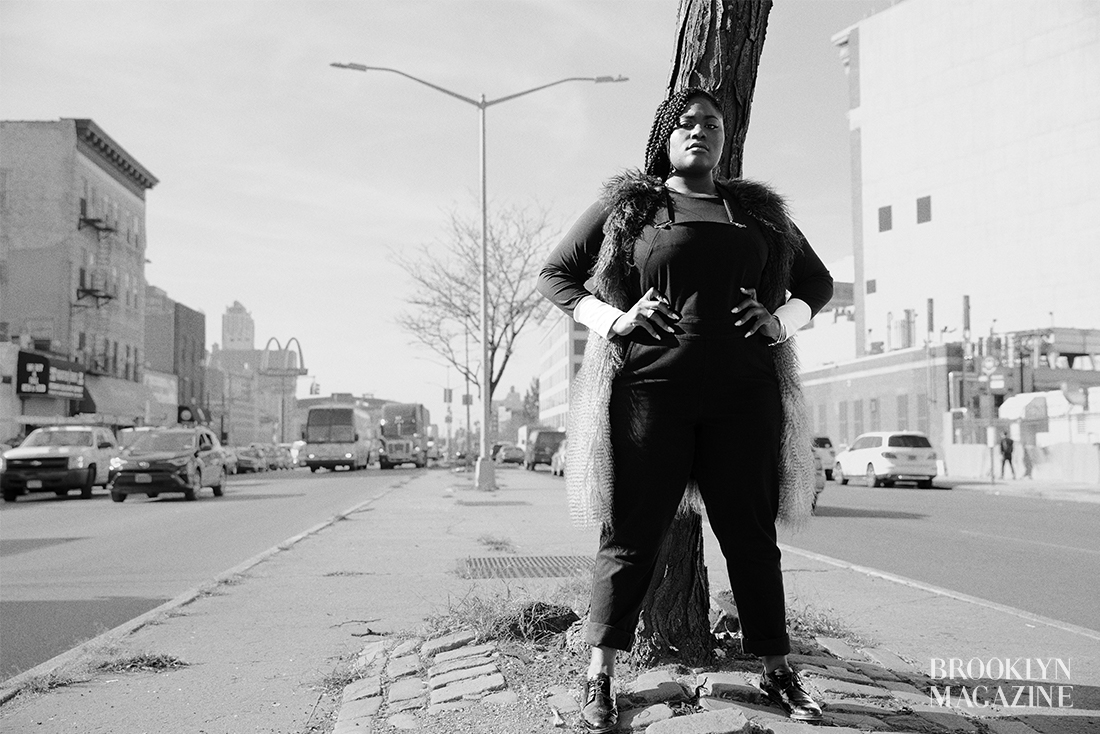

You might also like 














